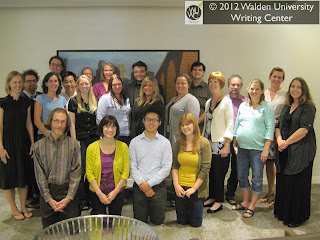The Year of Productivity, Part I: Resolutions
By Walden Writing Center Staff
Let’s hope you are no longer writing 2012 on your checks or in your diary, and that your holiday decorations have been stowed. Yes, it’s a new year—full of promise, possibility, and subzero temperatures. Walden Writing Center tutors and editors recently huddled inside, away from the brutal winds of Minnesota, and talked about their goals for 2013.
Let’s hope you are no longer writing 2012 on your checks or in your diary, and that your holiday decorations have been stowed. Yes, it’s a new year—full of promise, possibility, and subzero temperatures. Walden Writing Center tutors and editors recently huddled inside, away from the brutal winds of Minnesota, and talked about their goals for 2013.
Specifically,
they answered the question What is your
writing resolution?
A few plan to read:
- Tobias: Resubscribe to The New Yorker and read it every week, before the new issue arrives.
- Sarah: Listening to NPR recently, I heard an author talk about a book in which the process of writing a novel was broken down into steps over a period of 90 days. Because I always have problems with motivation, my resolution is to actually read this book. I’m hoping it will give me some ideas for staying committed and on task. [Editor’s note: The book is called The 90-Day Novel by Alan Watt.]
- Deanna: Write, read, or recite a poem a day.
Others will write in their journals:
- Melanie: I’m writing in my journal for a few minutes every day or two. It keeps me observant throughout the day. I pay closer attention to ideas that percolate while I’m at the office or in traffic. Writing helps me keep track of those ideas, too. If I hatch a plan for research or baking or knitting, I describe it in my book. The idea will develop or drift aside to let stronger ideas through. Finally, writing in my journal helps clear my head. Reflecting on today helps me organize my thoughts and be more efficient (and observant) tomorrow.
- Jen: Honestly, with two young kiddos in the house (my oldest is 3.5 years and my youngest is 8 months), I have to keep my writing expectations realistic, which is to say minimal. When I'm not wearing my editor hat, I'm a poet and nonfiction writer, and much of what I write is drawn from the material of my own life, so right now my focus is on maintaining my repository of material (also known as my journal), so when I do have time to write seriously again, the moments I want to write about are not lost in the twilight. My resolution for this year, as it is every year, is to keep up with my journal, which means writing at least three or four days a week, recording moments, stories, problems, responses—whatever seems most important to remember about these early days of my children's lives and my life with them. I write as much as I can, whenever I can—often late at night—and with as much clarity and detail as I can muster in my perpetually sleep-deprived state. And then I just hope it's enough.

Still others pledge to stretch themselves as writers—by breaking the procrastination habit, taking on new strategies, or seeking publication:
- Paul: Finish drafts well before deadlines so that I have time to revise! I am a horrible procrastinator and usually scramble to get even a first draft done by deadlines. My writing gets infinitely better the more times I revise, though, and I need to work on getting a first draft done earlier so that I can revise multiple times with feedback from friends.
- Amber: In 2013, I plan to copy the writing strategy of a friend of mine. Rather than waiting for the mythical free afternoon to offer itself up to me, I am planning a 15-minute writing break into each morning. I prefer to work in longer stretches, but those aren’t often available to me these days. My challenge will be to learn to work within the time frame I have, rather than wishing for the time frame I prefer.
- Nathan: Write more about themes or subjects I am less familiar with, and write less about the things that I know (particularly myself).
- Rachel: Actually stick my neck out and submit some of my work for publication. It’s a little bit scary to take that step, but I guess I need to take some risks in order to get anywhere.
Finally, we cannot forget the little things:
- Amy: To integrate a wider variety of vocabulary. By doing so, I hope to avoid clichés and words that have atrophied due to overuse (such as awesome and great).
- Brian: To not use sentence fragments. Ever. Even if I’m tempted.
What’s your 2013 writing resolution? We wish you good luck!
Subscribe to:
Post Comments
(
Atom
)




No comments :
Post a Comment